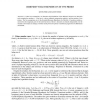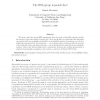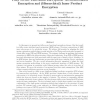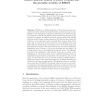5 search results - page 1 / 1 » Proving in Zero-Knowledge that a Number Is the Product of Tw... |
EUROCRYPT
1999
Springer
13 years 11 months ago
1999
Springer
Abstract. We present the first efficient statistical zero-knowledge protocols to prove statements such as: – A committed number is a prime. – A committed (or revealed) number ...
EM
2010
13 years 1 months ago
2010
Under two assumptions, we determine the distribution of the difference between two functions each counting the numbers x that are in a given arithmetic progression modulo q and the...
EUROCRYPT
2005
Springer
14 years 16 days ago
2005
Springer
We prove, under the strong RSA assumption, that the group of invertible integers modulo the product of two safe primes is pseudo-free. More specifically, no polynomial time algor...
EUROCRYPT
2010
Springer
13 years 11 months ago
2010
Springer
In this paper, we present two fully secure functional encryption schemes. Our first result is a fully secure attribute-based encryption (ABE) scheme. Previous constructions of AB...
ASIACRYPT
2003
Springer
14 years 7 days ago
2003
Springer
Abstract. ESIGN is an efficient signature scheme that has been proposed in the early nineties (see [14]). Recently, an effort was made to lay ESIGN on firm foundations, using the...




